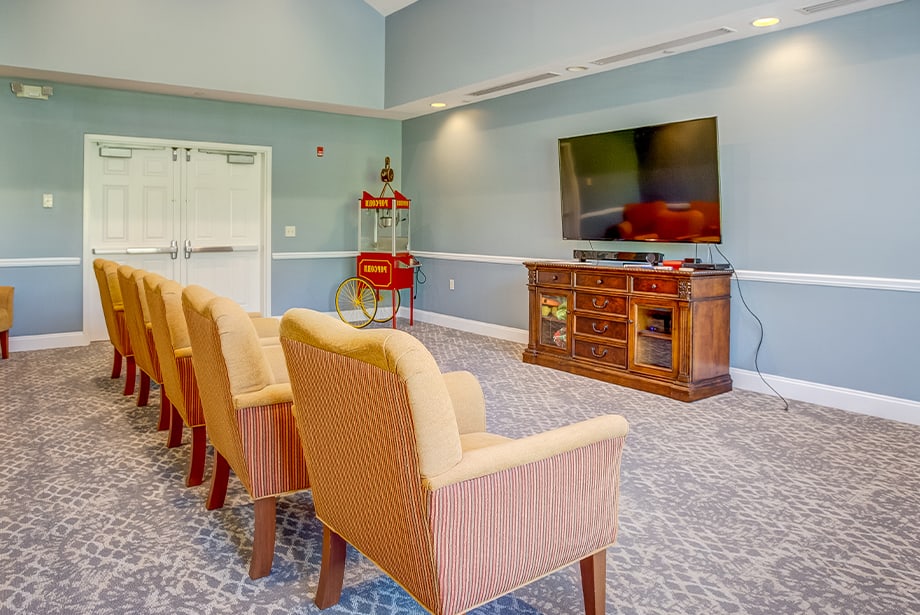As a loved one ages, their needs may evolve, and ensuring they receive the right level of care is essential. At The Enclave of Franklin, we understand the importance of providing personalized support throughout their journey.
While assisted living offers a supportive environment for many seniors, dementia can progress to a point where specialized care becomes necessary. At The Enclave of Franklin, we understand this move can be a difficult decision, and our priority is ensuring your loved one receives the care they need to thrive.
But it may be time to move from assisted living into memory care if you watch for indicators like:
- Increased confusion
- Changes in behavior
- Declining physical health
- Increased difficulty with daily tasks
- Safety concerns
If you notice any of these signs, it’s important to talk to your loved one’s doctor and the staff at their assisted living community. Together, you can develop a plan that best meets your loved one’s needs.
What Is Memory Care?
Memory care communities cater to individuals with Alzheimer’s, dementia, or other cognitive impairments. These specialized environments go beyond daily living assistance, offering a comprehensive approach focused on safety, well-being, and a sense of purpose.
They provide a structured and supportive environment to foster well-being and promote independence, dignity, and belonging. They also provide families with peace of mind, knowing their loved ones receive specialized care in a safe and secure setting.
Lilac Trace Memory Care
The Enclave at Franklin is a Lilac Trace Memory Care neighborhood. This lifestyle offers a unique and personalized approach to memory care based on each resident’s needs. Our skilled team of professionals develops customized care plans that take into account individual cognitive abilities, interests, and preferences in a warm and welcoming environment where residents feel safe, secure, and valued.
Signs Indicating a Transition from Assisted Living to Memory Care
Increased Confusion
Is your loved one experiencing more frequent episodes of confusion, disorientation, or difficulty following directions? This could be a sign of progressing dementia. Here are some examples to watch for:
- Forgetting recently learned information or conversations frequently.
- Having difficulty recognizing familiar people or places.
- Struggling to follow simple instructions or complete routine tasks.
- Wandering or getting lost even in familiar surroundings.
Memory care communities provide structured routines and trained staff who can help residents navigate confusion and maintain a sense of well-being.
Behavioral Changes
Have you noticed personality changes, agitation, anxiety, or difficulty managing daily routines? Changes in behavior can be another indicator that your loved one might benefit from memory care. Here are some behavioral changes to look out for:
- Increased agitation, anxiety, or depression.
- Personality changes, such as becoming withdrawn or suspicious.
- Difficulty managing daily routines like getting dressed or bathing.
- Verbal or physical outbursts.
Memory care communities provide a safe and secure environment with trained staff who can manage behavioral changes and create a calming atmosphere for residents.
Declining Physical Health
Has your loved one experienced a decline in physical health that makes it challenging for them to participate in assisted living activities? Declining physical health can sometimes necessitate a transition to memory care. Here are some signs to watch for:
- Frequent falls or injuries.
- Decreased mobility or difficulty with activities of daily living.
- Unexplained weight loss or changes in appetite.
- Increased need for medical attention.
Memory care can provide a higher level of medical care and assistance with daily living activities than assisted living. They can also offer specialized programs and therapies to help residents maintain their physical health and well-being.
Safety Concerns
Are you worried about your loved one wandering, getting lost, or having difficulty with personal care tasks like bathing or dressing? Safety concerns are a major consideration when deciding if memory care is the right choice. Here are some specific safety concerns to keep in mind:
- Wandering off unattended or getting lost in familiar places.
- Leaving appliances or faucets running unattended.
- Difficulty with personal care tasks such as bathing, dressing, or toileting.
- Increased risk of falls or injuries.
Memory care communities offer secure buildings and grounds, with staff trained to supervise residents discreetly and ensure their safety. They can also provide assistance with personal care tasks, reducing the risk of falls and injuries.
How to Plan & Navigate the Transition Process
Transitioning a loved one from assisted living to memory care can be a challenging but important decision. We’re here to support you every step of the way with this guide to planning and navigating a smooth transition.
Research & Evaluate Memory Care Communities
- Identify needs: Start by considering your loved one’s specific needs, such as the level of care required, preferred amenities, and budget.
- Research options: Look for memory care communities in your area that offer the services and environment best suited to your loved one’s needs. Use online resources, senior care directories, and recommendations from trusted sources.
- Schedule visits: Once you’ve narrowed down your options, schedule visits to tour the communities, meet the staff, and observe daily activities.
Include Your Loved One in the Decision-Making Process
- Open communication: Maintain open and honest communication with your loved one throughout the process. Discuss their concerns and preferences, and involve them in decision-making as much as possible.
- Respect and reassurance: Be respectful of their feelings and anxieties. Reassure them that this transition is about ensuring their well-being and safety.
Plan & Prepare for the Move
- Gather information: Work with the memory care community to understand their move-in procedures and any paperwork required.
- Downsizing and packing: Help your loved one downsize and pack familiar belongings that will create a sense of comfort in their new space.
- Prepare the new living space: Work with the staff at the memory care community to personalize their new living space with familiar items and photos.
Stay Engaged & Offer Support
- Regular visits: Maintain regular visits with your loved one to show your continued love and support.
- Communication with caregivers: Communicate openly with the caregivers in the memory care community. Share information about your loved one’s preferences and routines to ensure a smooth transition.
- The Enclave at Franklin: your ongoing partner: Remember, we are here for you and your family throughout this journey. Don’t hesitate to reach out with any questions or concerns you may have.
Make Informed Decisions for Loved Ones
Deciding to move a loved one from assisted living to memory care is never easy, but it is often the best decision for their safety and well-being. By recognizing the signs, understanding the benefits, and carefully planning the transition, you can help find your loved one in a supportive and caring community that provides compassionate, specialized care.Call us today to schedule a visit at The Enclave of Franklin to discuss how our community can meet your or your loved one’s needs. We’re happy to schedule a community tour for you.










